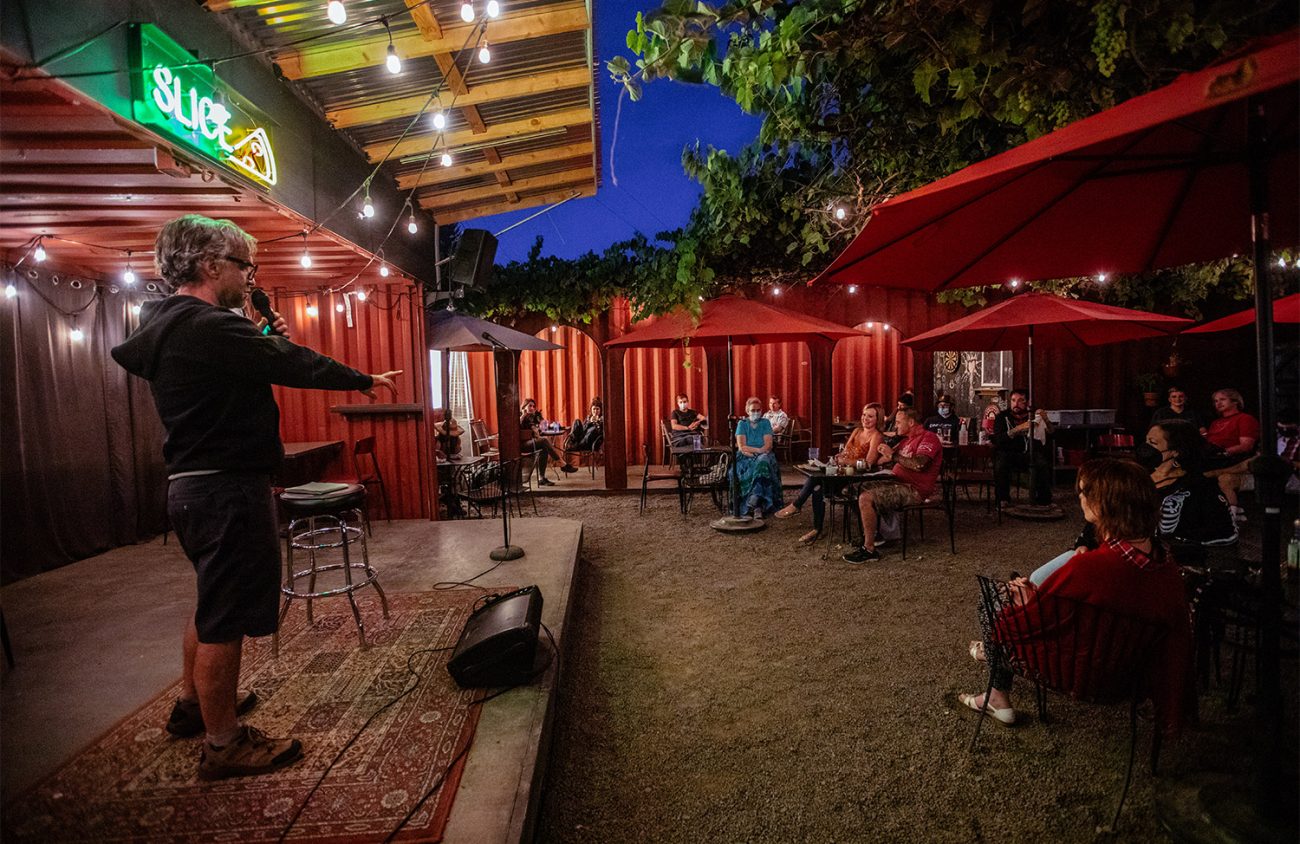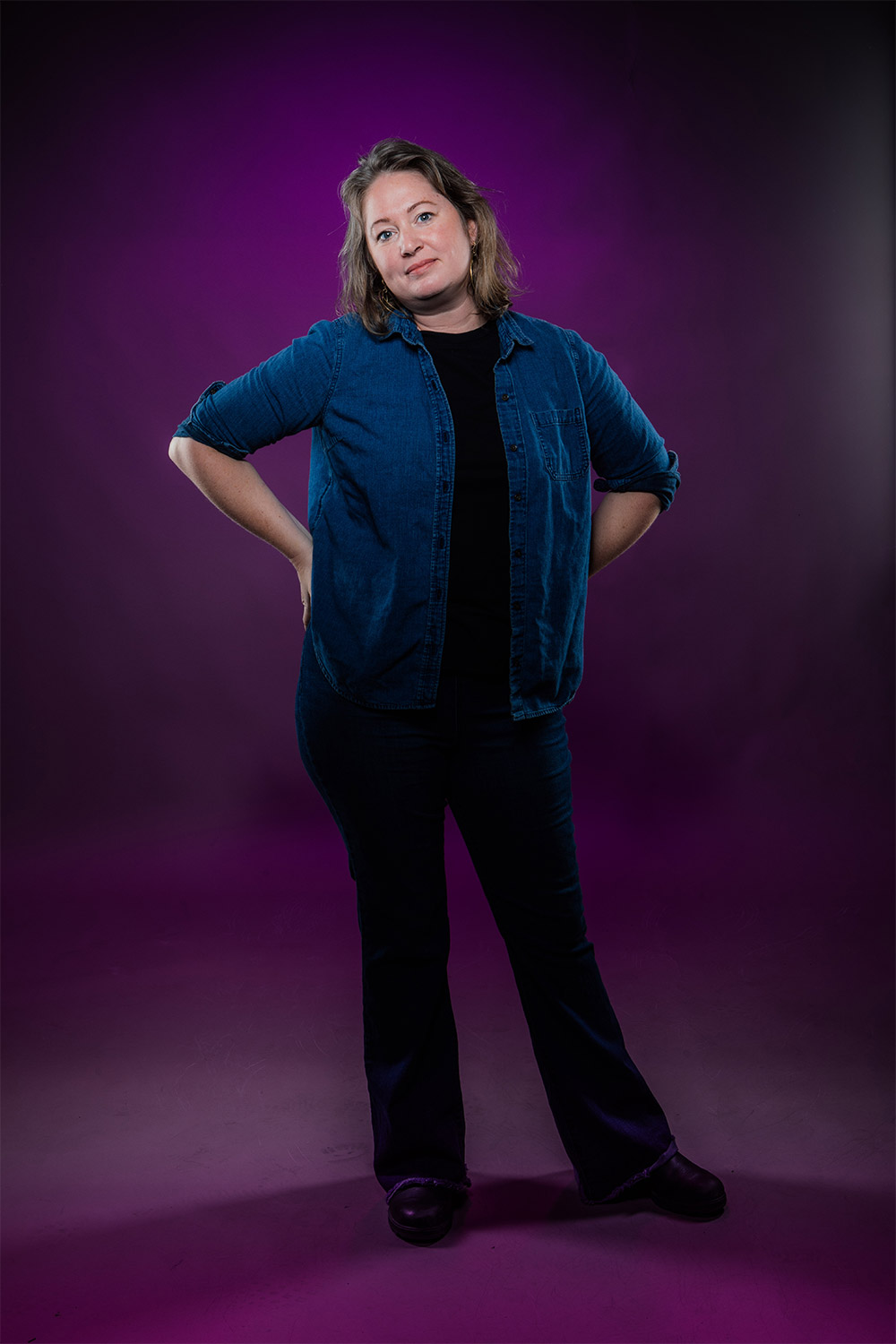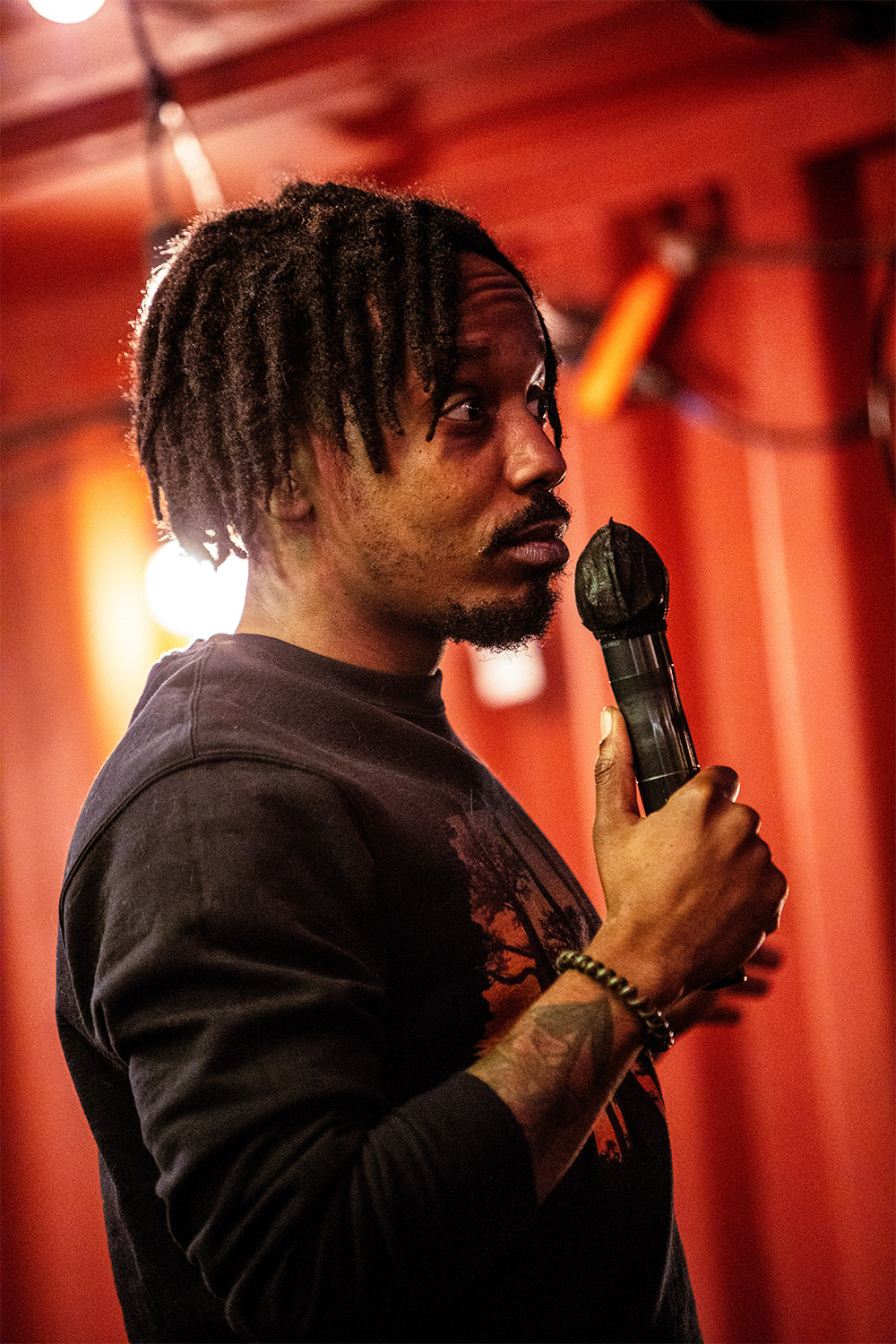Those were the funniest five minutes of my life, I thought, following my first attempt at stand-up comedy. I was stepping from the stage amidst a warm response at an open mic, held weekly on Monday nights at Slice Pizzeria and Bar in the Whiteaker neighborhood.
As a fan of comedy, I’d always wanted to try.
“When I was younger, everyone told me I look like Fred Armisen,” I said on stage. “As I grow older, though, I think I’m turning into Marc Maron.”
“A little bit!” came a voice from the crowd, amidst a flurry of laughter.
The outdoor stage and patio area at Slice is covered by a trellis and grape vine canopy, with cafe-style seating. Each year since my 40th birthday, I’ve pledged to try stand-up, but I never managed to get up the courage. Nevertheless, I maintained a running list of jokes, kept track of through keywords and verbal prompts, written down on a pad of paper which I brought with me to the stage.
Turning 45 this summer, and spending the previous year staring down the barrel of some existential quandaries — as we all have — I figured, the time was now. I was teeth-rattling nervous the first time I went up. The crowd at Slice was giddy to be out. It was early in the summer, and COVID restrictions were recently lifted. They laughed well but not outrageously.
I had a few friends in the crowd, but I wanted someone as close as my wife to hold off until I tried it at least once. Making a fool of myself in front of strangers is one thing; making a fool of myself in front of her was another thing entirely.
There was a deconstructed chicken-cross-the-road joke:
“I saw a chicken cross the road,” I said, telling a true story. “Ran right across. I mean, think about that. We’ve all heard so much about it. But why?”
A low ripple of laughter murmured through the crowd. One guy, though, in the back, gave a hearty, punctuated, chuckle. I’ll always remember his face.
I did stand-up once and I survived. I called my own bluff. Could I do it again? Or should I simply check it off the to-do list, and move on?
In the moment, that felt likely. How could I think of more funny stuff to fill five minutes in a week? To calm my nerves, I checked in with some more-experienced comics about their process.
Angie Bloomfield has been doing comedy in Eugene for a few years now, and in 2020 she won a staff pick as best stand-up comic in Eugene Weekly’s Best of Eugene, following an informal poll of her fellow comedians.
According to Bloomfield and several other comics I spoke with, comedy open mics, often known simply as “mics,” are for practice. For this reason, someone interested in trying stand-up shouldn’t put too much pressure on themselves to have brand-new material each week.
“It’s important to figure out the best way to tell something,” Bloomfield says. “You definitely want to try things more than once, just to get a feel for it.”
Nevertheless, Bloomfield does sometimes get self-conscious about repeating her jokes.
“When I talk to other comics, everyone’s like, that’s what you’re supposed to be doing,” while also making sure to try new things, she says.
COVID permitting, the Slice mic is just one of four weekly mics in Eugene, the others being at Luckey’s Cigar Club, The Drake and a brand-new mic launched recently at The Barn Light.
All but one of those indoor mics are postponed on account of the pandemic — the Barn Light mic continues with proof of vaccination required — but the outdoor Slice mic goes on as planned, following safety precautions
In non-pandemic times, there are also frequent comedy showcases at venues like First National Taphouse, with local comedy promoters like Just Comedy and Eugene Comedy Crescendo making great strides toward putting Eugene on the national stand-up comedy touring circuit.
These events and performances all form the backbone of Eugene’s nascent stand-up comedy scene, growing more robust each year, with an inclusive and diverse group of local comics honing their craft whenever and wherever they can.
Little did I know how quickly one time on stage reframes your brain.
My 12-year-old daughter asked me how comedy’s been going. I told her, and she said, “Dad, you’re living your dream at age 45.”
“Aww, thanks honey,” I responded.
“Dad, that’s not a compliment.”
“Oh my god, that would just kill on stage.” I thought.
So next time I went up, I told it. I don’t know if it “killed.” But it certainly got a laugh.
And just like that, I began looking at the world in the context of bits: Take a true story, move this part, make up this other bit, and put a bow on it.
Easier said than done.
But if you think stand-up comedy sounds terrifying, I supplement income as a freelance journalist writing things like toilet installation guides on the internet. Now that’s terrifying.
What slowly sank in through my experience is that funny stuff is only the first step. To progress as a comedian is less about that, and more about molding your point of view on the world into something funny to an audience.
Soon I had more ideas. I had to go back on stage, and every Monday since then, I’ve tried stand-up at Slice. So many people dream of doing it — who hasn’t been funny at a bar or party, or been everyone’s favorite cut-up in a business meeting?
But is that really all there is to it?
Originally from Philadelphia, Chadhurst Sharpe has been doing comedy for about three years. Since moving to Oregon about nine years ago, Sharpe’s performed all over the Willamette Valley, and he’s one of the most polished regulars at the local open mics.
When it comes to writing comedy, Sharpe says he paces back and forth with a voice recorder, talking to himself sometimes for up to two hours. By the end of it, he has a five-minute set.
“I start with one or two ideas in my head and go from there,” he says. “I think saying the set out loud is key as it allows you to memorize the critical inflections and pauses for each joke.”
Following these private improv sessions, hammering out and memorizing content, Sharpe’s ready to perform. He agrees that often what the comedian thinks is funny and what the crowd thinks is funny will differ.
“I can’t tell you how many times a punchline gets a few chuckles, but the transition sentence gets roaring applause,” Sharpe continues. “I think what’s most important is writing what you think is first and foremost funny, secondly, true, and thirdly, relatable. In that order.”
Another comic who performs regularly in Eugene goes by Bert Walpack. He grew up in New Jersey, and tried his hand at stand-up in New York City, sometimes doing mics as often as five times a week.
Walpack goes on to say that when he started doing comedy, he had jokes but what he really had were premises for jokes.
“I didn’t know the difference, but unfortunately audiences know,” he says.
Burned out on the hustle, Walpack quit comedy and moved to Eugene in 2007.
“I never thought I would do comedy again,” Walpack says. But by 2016, he was back at it, performing regularly at showcases and mics, and opening for touring artists. According to Walpack, comedy was his mid-life crisis, his Mazda Miata.
“I had a few ideas in my head that I thought were funny, and I needed more in life than just working and kids. The bits in my head are what keep me going. Trying a bit on stage and seeing it work creates a huge dopamine release.” Sometimes it takes years before a joke is perfected, he says.
“Here’s the thing: Punchlines are hard,” Walpack continues. “It’s the most important thing we do. I know it sounds like it doesn’t need to be said, but once you start adding punchlines to every joke, comedy becomes more fun.”
In the parlance of stand-up comedy, I haven’t killed — or been riotously successful — at any of the half dozen Slice mics I’ve tried. Then again, I feel like I only bombed once.
After that set, though, I knew I had to keep going. I couldn’t let it end there. As much as I love it, my deconstructed chicken joke fell flat. It felt awful, icy cold. I nearly bolted. I dropped the joke from my set.
What’s clear is, stand-up is something like therapy, sardonically turning life’s knife in the back into something like a grin. It’s also a little like jazz improv, at an open mic at least: the audience laying down the rhythm, and each comic taking their turn on their instrument. Some senses of humor are like a tenor sax, others like a trumpet, still others, a piano.
Stand-up comedy is a tightwire act. What the first-person essay is to fiction, stand-up is to acting. And when a joke falls flat, it’s less a signal of failure than a challenge to do better: between you, the joke, and the audience, but also, between you and the other comics.
Or maybe that’s just me. And maybe that means I’m hooked.
Slice Pizzeria and Bar is located at 825 Blair Boulevard in Eugene. Sign-up for the Slice Stand-Up Comedy Open Mic is 7:30 pm Monday nights, show time is 8 pm; FREE and all-ages with adult content. For more information search Eugene Comedy Scene on Facebook and social media or check EW’s What’s Happening Calendar.


